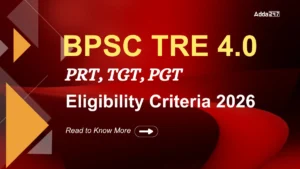Table of Contents
Imagine completing your PhD not in five or seven long years, but within just two and a half years, the same duration followed by scholars in countries like the United States, Germany, and Australia. The All India Council for Technical Education (AICTE) is working on a revolutionary change that could make this a reality for Indian researchers.
This bold move aims to bring Indian doctoral research in technical education closer to global standards by cutting PhD duration, improving research quality, and streamlining funding processes. The proposal also hints at a major structural change, where AICTE may replace UGC in managing technical PhDs, making research faster, more efficient, and more transparent.
Latest update on PhD Admission
The AICTE’s proposal to introduce a 2.5-year PhD model could mark the most transformative reform in India’s higher education sector in decades. Check the details Here
| Key Points | Details |
|---|---|
| Regulatory Body Introducing Reform | All India Council for Technical Education (AICTE) |
| New PhD Duration | 2.5 Years |
| Focus Area | Technical and Engineering Disciplines |
| Major Change | AICTE to manage technical PhDs, replacing UGC in these domains |
| Publication Requirement | At least one Scopus Q1-indexed journal article |
| Use of Artificial Intelligence | Allowed with citation and ethical compliance |
| Supervisor Eligibility | Active and retired professors eligible |
| Implementation Timeline | Expected from July 2025 |
| Key Objective | Improve efficiency, global parity, and research quality |
| Expected Outcome | Shorter PhD duration, faster funding, enhanced global competitiveness |
What’s the New PhD Change?
The AICTE has proposed to reduce the PhD completion timeline from 5 years to 2.5 years for candidates pursuing research in technical disciplines. This change will redefine how PhDs are managed, funded, and evaluated in India. Here are the key highlights of this new change:
- PhD Duration Cut to 2.5 Years: Scholars will be able to complete their doctoral research within half the traditional time.
- Mandatory Publication Requirement: Candidates must publish at least one research paper in a Scopus Q1-indexed journal before thesis submission.
- AI Usage in Research: Scholars can use artificial intelligence tools for research, data analysis, and writing, while ensuring proper citations and academic integrity.
- Retired Professors as Guides: For the first time, retired professors can act as PhD supervisors, offering their experience and mentorship.
- Shift in Oversight: Technical PhDs may move under the purview of AICTE instead of the University Grants Commission (UGC), creating a dedicated structure for technical research.
- Formation of a Task Force: A special committee led by Dr. Venu Gopal, former Chancellor of Bor University, has been formed to create a new framework for this model.
What Will Be the Benefits of the New PhD Change?
This proposed reform is not just about shortening timelines, it’s about transforming the quality, speed, and global relevance of PhD programs. Here’s how it will benefit scholars and the academic ecosystem:
- Accelerated Career Growth: Completing a PhD in 2.5 years allows scholars to enter the job market or post-doctoral opportunities faster, enhancing employability.
- Better Research Efficiency: The use of AI and stricter publication standards will encourage high-quality, impactful research within shorter timeframes.
- Simplified Funding and Management: AICTE aims to minimize delays in research funding and stipend disbursal that often plague UGC’s system.
- Global Benchmarking: Aligning India’s PhD duration with international standards will improve recognition and global collaboration opportunities.
- Stronger Mentorship: Inclusion of retired professors as guides ensures students get experienced supervision and personal attention.
- Boost to Technical Disciplines: This initiative focuses on technical and engineering-related PhDs, ensuring better guidance, structured progress, and innovation-driven research.
How It’s Different from Traditional PhD
Let’s understand how this new model stands apart from the traditional PhD framework in India:
| Aspect | Traditional PhD (UGC) | New AICTE PhD Model |
|---|---|---|
| Duration | 5 to 7 years | 2.5 years |
| Regulatory Body | University Grants Commission (UGC) | All India Council for Technical Education (AICTE) |
| Focus Area | Humanities, Social Sciences, Science | Technical and Engineering Disciplines |
| Publication Requirement | Often optional | Mandatory Scopus Q1-indexed publication |
| Supervisor Eligibility | Only active faculty | Retired professors also eligible |
| Use of AI in Research | Limited | Encouraged with ethical usage |
| Funding & Management | Managed by UGC; often delayed | Managed by AICTE; expected to be streamlined |
Who Will Get the Benefits?
The benefits of this change will primarily extend to students and professionals associated with technical and engineering education in India.
- PhD Aspirants in Technical Fields: Those pursuing research in computer science, mechanical, civil, electrical, or related disciplines will benefit from faster completion and AICTE funding.
- Working Professionals and Researchers: Professionals looking to pursue a doctoral degree while balancing careers will find this model more practical and goal-oriented.
- Retired Academicians: Experienced retired professors can now serve as mentors, contributing to the academic ecosystem without administrative barriers.
- Higher Education Institutions: Universities and institutes under AICTE will witness a surge in quality research, publication output, and international collaborations.
- India’s Research Ecosystem: Overall, this change will strengthen India’s position in global research rankings, attract international partnerships, and promote innovation-led education.




 UP Government Announces Rs. 18,000 Salar...
UP Government Announces Rs. 18,000 Salar...
 BPSC TRE 4.0 Eligibility Criteria 2026 f...
BPSC TRE 4.0 Eligibility Criteria 2026 f...
 Assam Government Announces Massive 75000...
Assam Government Announces Massive 75000...













